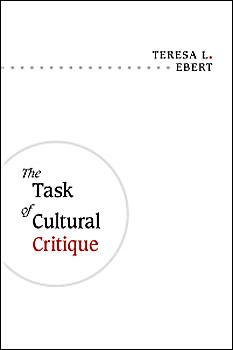Noted Marxist Theorist Moves Critique Beyond Cultural Representations
 |
UCLA scholar Peter McLaren calls Professor of English Teresa Ebert's new book "a path-breaking text that will explode the field." |
UAlbany Professor of English Teresa L. Ebert, whose book The Task of Cultural Critique was recently published by University of Illinois Press, is regarded as "one of the most significant Marxist theorists currently writing about the humanities."
MacArthur Fellow Mari Jo Buhle writes that Ebert's writings on feminism and materialism are the work of "perhaps the most distinguished 'materialist' of the field."
The Task of Cultural Critique is part of her ongoing work to transform what she calls "canonic" cultural critique and make it more socially active.
Criticism, she says, is an ahistorical judgment based on moral "values," but "critique" is an inquiry into the conditions that make a text possible. It is not enough to criticize a novel as "sexist." The question is what are the conditions that make its sexism possible � why is it sexist? How do we explain it in order to change sexism?
She traces the history of critique to Kant, Hegel, Nietzsche, and Marx.
UCLA scholar Peter McLaren calls Ebert's new book "a path-breaking text that will explode the field."
According to Ebert, mainstream critique has trivialized itself by its narrow focus on cultural representations.
"Rather than simply 'interpreting' the pictures from Abu Ghraib in terms of their internal rhetoric or focusing on Barack Obama�s language to weigh the validity of war in Afghanistan, cultural critique needs to explain the material relations that are manifested through representations and how to change them."
This knowledge is produced by relating seemingly disparate issues.
"Only by relating the war in Afghanistan, for example, to health care reform, the banking crisis, the conditions of the educational system and food safety, is critique able to produce transformative social knowledge," Ebert said.
"One understands these issues by grasping the invisible abstract relations that connect them all together. The role of cultural critique is to make these invisible abstract relations visible � not simply to focus on the concrete, visible surfaces of cultural representations."
Ebert's writings and teaching include such diverse subjects as cultural theory, literature, globalization, gender, class relations, food and hunger, digital economy, and theory of popular culture.
She has also written Ludic Feminism and After, co-written Class in Culture, co-edited two other books, and just completed a new book, Hypohumanities. Its title refers to the reduction of the humanities to training in communication, digital and affective skills useful for the workforce of capitalism.
![]() For more news, subscribe to UAlbany's RSS headline feeds
For more news, subscribe to UAlbany's RSS headline feeds


